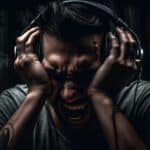Concussion Aftermath: The Silent Echo of Tinnitus & How to Navigate It
- Get link
- X
- Other Apps
Introduction
Imagine you’re in a serene mise-en-scene, but there’s an intrusive, relentless ringing sound that just won’t fade. Migraines ensue, concentration evanesces, serenity quelled. This is the unfortunate reality for those with Tinnitus. Things might even get more intense if it descends after a concussion. This article will delve into the overlap, causes, symptoms, management strategies, and more about concussion and tinnitus.
Definition of Key Terms
What is a Concussion?
It’s no secret that our brains are important, right? But imagine it being knocked around inside your head – that’s exactly what happens when you get a concussion. It’s a type of traumatic brain injury invoked by a blow or jolt to the head or body. This blow causes your brain to sway or twist, potentially damaging brain cells and creating chemical changes in your brain. We know that sounds intense and truth be told, it is!
Understanding Tinnitus
Tinnitus, on the other hand, is the perception of sound when no actual external noise is present. It can manifest as ringing, humming, whistling, roaring, hissing, or buzzing, of varying volumes, pitches, and pulsations, in one or both ears. Tinnitus can, at times, feel like your ears are conspiring to stage an insidious, never-ending concert. It’s especially prevalent in aged individuals or those exposed to loud noises, but did you know it could potentially be linked to concussions too?
Exploring the Link Between Concussion and Tinnitus
Post, during, or pre; words that perfectly situate the timeline for many incidents. Interestingly, when we speak about concussions leading to tinnitus, the ‘post’ is peculiarly predominant. Essentially, can concussions cause tinnitus? Yes. In fact, Post-Concussion Syndrome (PCS) is a complex disorder in which various concussion symptoms, including tinnitus, last for weeks or even years after the traumatic event that caused the concussion.
Tinnitus can occur as a direct result of the concussion due to damage to auditory pathways, or indirectly due to increased stress and anxiety levels following the concussion. Both these scenarios present a fact we cannot ignore – the link between concussion and tinnitus (add your website link here) is real and significantly impactful.
This paints quite a dire scene, doesn’t it? But don’t despair, because understanding the problem is the first step to managing it appropriately. And this article aims at illuminating this path towards management for both individuals living with these conditions and their loved ones alike. Stay tuned (no pun intended) as we navigate this echo further.
Make sure to check out our other resources about concussion and tinnitus (add your website link here) for more insightful information. And, of course, remember to consult healthcare professionals like those from the American Speech-Language-Hearing Association for personalized advice.
The Epidemiology of Concussion-Induced Tinnitus
Navigating the hushed, often ignored corridors of concussion-induced tinnitus places us before the chilling reality of its prevalence. CDC: TBI Data and Statistics highlight that millions are affected by traumatic brain injuries yearly, and a significant portion of them might, unfortunately, end up having to juggle tinnitus in the aftermath. The statistics are staggering, right?
Causes and Symptoms of Concussion and Tinnitus
Can Concussions Cause Tinnitus?
In case you’re wondering, concussions can indeed trigger tinnitus. Concussions can disturb parts of the brain accountable for auditory processing, causing that incessant ringing or buzzing peculiar to tinnitus. To put it simply, your ear isn’t genuinely ringing; instead, it’s your brain interpreting signals from damaged regions.
Symptoms of Concussion Tinnitus
A telltale sign of concussion-induced tinnitus is a concurrence between the onset of tinnitus symptoms and the event of the head injury. Also, it’s key to remember that directional hearing, sound sensitivity, and even sound distortion could tag along with the classic tinnitus ringing.
Treatment and Management of Concussion-Induced Tinnitus
Post Concussion Tinnitus Treatment
Recovering from concussion and tinnitus brings along a procession of challenges. Post-concussion tinnitus often requires holistic treatments encompassing medications, and physical and speech therapy to restore balance, hearing, and daily functions. Cognitive-behavioral therapies help quite a lot, especially when you need to hurdle over the psychological impacts.
Will Noise Cancelling Headphones Help Tinnitus?
As odd as it may sound, headphones can come in handy for tinnitus management. Not just regular headphones but noise-cancelling ones. They can aid in tinnitus retraining therapy (TRT), where the goal is to help the brain overlook the phantom noises. However, remember not to crank up the volume so high that you risk causing further damage.
Living with Tinnitus After a Concussion
Living day to day with the invisible clamor of tinnitus post-concussion can be tough, yet not impossible. Understanding that self-care, stress management, and a robust support system form an indomitable framework certainly keeps spirits high. Lifestyle adjustments like fostering healthy sleeping patterns, quieting down ambient noises, and avoiding triggers (stress, caffeine, loud noises) will make it manageable.
Are you wondering what on earth the Morse code-like signals in your ears mean? Could that tinnitus spring from your recent concussion? Unravel this mystery and manage effectively by linking to our comprehensive articles, such as Can a Chiropractor Help With Tinnitus and Tinnitus from Head Injury? Remember, understanding is the first step to managing and healing. Don’t let tinnitus limit you from cherishing life one octave at a time!
The Future of Concussion-Induced Tinnitus Research
The future promises progress and hope for the understanding and management of concussion-induced tinnitus. Strides are being made, with researchers tirelessly exploring new frontiers.
Recent Developments in Low-Frequency Tinnitus Research
New leaps in low-frequency tinnitus research have unveiled a myriad of insights into the comprehension and management of sounds that beat at the rhythm of one’s pulse. This could prove pivotal in the development of strategies for mitigating the impacts of concussion-induced tinnitus.
Neurosensory Tinnitus Reviews: Promising Results
Wouldn’t it be wow-inspiring to mute the ruckus of tinnitus with wearable technology? Neosensory, a silicone-based wristband technology, triggers vibration patterns in response to strong sounds, offering great potential in rehabilitating patients with post-concussion hearing ailments.
Conclusion
Navigating the labyrinth of concussion and tinnitus can feel like stumbling in the dark at times. But with new research and innovative approaches surfacing, like Neosensory and low-frequency tinnitus treatments, the future indeed gleams with promise. As we understand more about the intricate relationship between concussion and tinnitus, the road to managing and treating these conditions becomes clearer. Remember, you’re not alone on this journey. Keep learning, keep evolving, and remember to ring in a harmonic symphony within your life, unmarred by the discord of tinnitus. Add in the essential element of professional aid and arm yourself with insights from trusted sources like Mayo Clinic: Tinnitus and your journey towards silence might be shorter than you think!
Concussion And Tinnitus - Frequently Asked Questions (FAQ)
Yes, a concussion can lead to tinnitus. When a person suffers a concussion, the impact can damage the inner ear structures, which may result in ringing or other noises in the ear, a condition known as tinnitus.
The duration of tinnitus after a concussion varies from person to person. In some instance, it lasts for a short period and resolves on its own. However, for others, it might persist for a longer time, even becoming a chronic condition.
Yes, treatments are available for concussion-induced tinnitus. These include cognitive behavioral therapy, sound therapy, and certain medications. It’s important to consult with a healthcare professional for proper diagnosis and treatment.
Research indicates that the severity of the concussion may influence the severity and duration of tinnitus. However, individual experiences can vary significantly.
Noise-cancelling headphones can potentially provide some relief from tinnitus symptoms. The noise cancellation can help drown out the constant ringing or buzzing noise that one experiences.
The post Concussion Aftermath: The Silent Echo of Tinnitus & How to Navigate It appeared first on Pulsatile Tinnitus Treatments News - Tinnitus Relief.
Related posts:
https://ift.tt/2IWalCg
#tinnitus #pusatiletinnitus #earringing #whatistinnitus #howtostoptinnitus
- Get link
- X
- Other Apps



Comments
Post a Comment